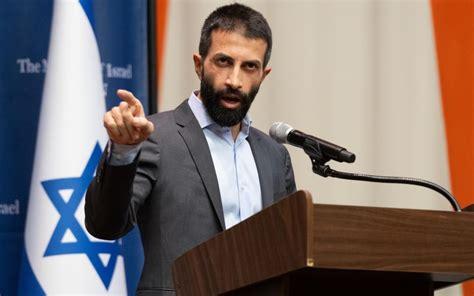
Israel ‘risks reviving Hamas’ by exchanging terrorists like my father for hostages
The son of a founding member of Hamas has warned Israel must not “rejuvenate” the terrorist group by releasing its most dangerous members – including his father – from jail as part of a hostage deal.
Mosab Hassan Yousef, 46, is the eldest son of Sheikh Hassan Yousef, one of Hamas’s foremost leaders in the West Bank. It had been expected that he would follow in his father’s footsteps and rise through the ranks to become a leading figure within Hamas.
But instead he was recruited to work for the Shin Bet, Israel’s internal security service, at the age of 17, and went on to work as a spy for Israel’s security service for a decade.
During that time he attempted to break the “cycle of violence against innocent people” , and the intelligence he provided helped Israel to thwart terrorist attacks at the height of the second intifada.
Mr Yousef’s father has spent more than 25 years in Israeli jails, according to the Palestinian Information Centre, having been arrested several times over the past two decades by the Israeli security services.
He is currently in an Israeli prison after being arrested on Oct 19, 2023 as part of the crackdown on Hamas following its Oct 7 invasion of southern Israel in which more than 1,200 people were killed, and 254 taken into Gaza as hostages.
As reports emerge that a deal to end the war in Gaza and return Israeli hostages could be reached in the coming weeks, Mr Yousef urged Israel not to release Hamas terrorists from its jails as part of the agreement, including his father and others who he said he helped to “bring to justice”.
He told The Telegraph: “The only card in Hamas’s hands today is the hostages – they want the release of hundreds if not thousands of mass murderers from Israeli prisons.
“The most dangerous Hamas leaders today are not in Qatar or Turkey – they are in Israeli prisons. That includes my father.
“And Hamas wants to force Israel – using the international community and the global pressure – to release mass murderers of the calibre of [former Hamas leader, Yahya] Sinwar. They want them released back to the streets, can you imagine?”
Mr Yousef warned that releasing senior Hamas members from Israeli jails as part of an exchange deal for Israeli hostages “could actually rejuvenate Hamas and bring us to square one”.
He added: “We are talking about some very dangerous people – even if they are released abroad they can continue forming and creating terrorist cells and attacking Jews worldwide.”
Last November, Israel and Hamas reached a temporary ceasefire agreement in which 81 hostages were released in exchange for 240 Palestinian prisoners.
In August of this year, one of the Palestinian prisoners freed in the swap carried out a terrorist attack, shooting and seriously wounding an Israeli man along with two Palestinians in the West Bank.
During his time as a spy, Mr Yousef was considered to be one of Israel’s most valuable sources operating from inside the Hamas leadership, and his recruitment was kept a secret even within the Shin Bet.
But after emigrating to America in 2007, and claiming political asylum, Mr Yousef decided to reveal his identity and publish his memoirs.
Last month, he travelled to the UK to speak at the Oxford Union in a debate on the motion: “This house believes Israel is an apartheid state responsible for genocide.”
He said that as he entered the debating chamber he was “mobbed, insulted and intimidated”, adding: “Some people were doing signs to cut our throats, we were accused of ‘treason’ and called bad names in Arabic.”
He said it gave him flashbacks of his time in the West Bank, explaining: “All of a sudden I realised, am I back in Ramallah? Am I back in Palestinian territory where I am condemned to death?”
Last week, Hamas and Israel accused each other of sabotaging a potential ceasefire and hostage deal despite both sides reporting “significant” progress in past days.
Negotiations, mediated by Qatar, Egypt and the US, have taken place in Doha this week, rekindling hope for an agreement that has proved elusive.
Hamas accused Israel of laying down “new conditions”, while Benjamin Netanyahu, Israel’s prime minister, claimed the Palestinian terror group was going back on understandings already reached.
Source » telegraph.co.uk





